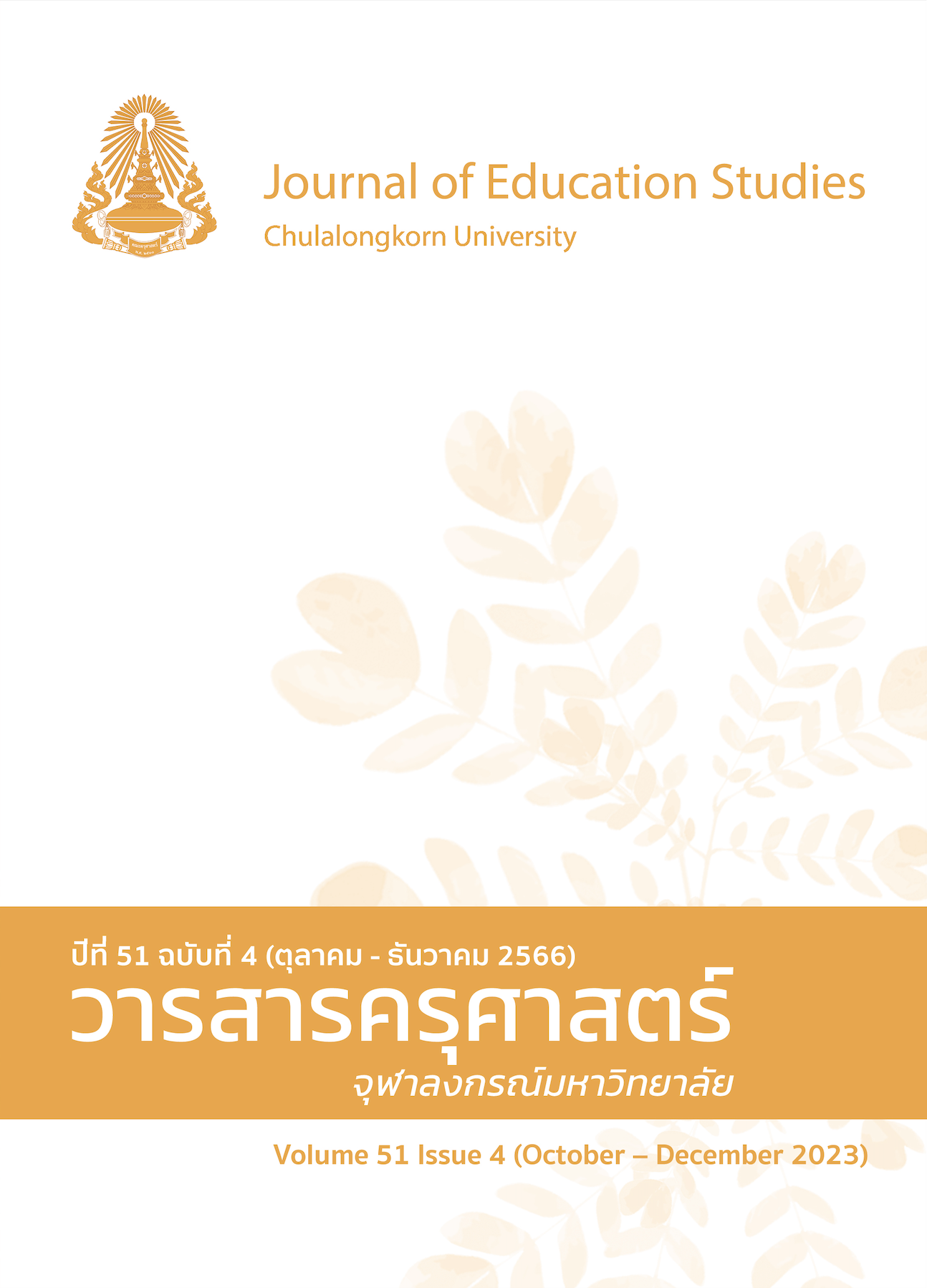The Model for Digital Competency Development for Teachers in The Digital Transformation Era for The Secondary Educational Service Area Office, Khon Kaen
DOI:
https://doi.org/10.14456/educu.2023.30Keywords:
model, competency, digital competency of teachersAbstract
The objectives of this research were: 1) to create a digital competency development model for teachers in the digital transformation era under The Secondary Educational Service Area Office in Khon Kaen, and 2) to evaluate this model in terms of suitability, possibility, and utility. The target group was divided into two groups; the first group consisted of five key informants, including executives, academic officers, and teachers with expertise in digital technology, while the second group consisted of seven professionals to assess the model. The instruments used were 1) a semi-structured interview form, and 2) a model evaluation form in terms of suitability, possibility, and utility. Basic statistical data were analyzed using the SPSS statistical package program. The research found that developing the digital competency model for teachers in the digital transformation era under The Secondary Educational Service Area Office in Khon Kaen included 1) the model name, 2) principles and concepts of the model, 3) purpose of the model, 4) criteria for success, and 5) relevant guidelines. This is consistent with the empirical data, from which suitability, possibility, and utility were all evaluated to be at the highest level.
References
ภาษาไทย
กิตติพศ โกนสันเทียะ และคณะ. (2565). สมรรถนะดิจิทัล: สมรรถนะใหม่สำหรับครูยุคปัจจุบัน. วารสารศึกษาศาสตร์ มหาวิทยาลัยทักษิณ. 22(2). 14-23.
กระทรวงศึกษาธิการ. (2564, 29 มีนาคม). คําแถลงนโยบายการจัดการศึกษา รัฐมนตรีว่าการกระทรวง
ศึกษาธิการ (นางสาวตรีนุช เทียนทอง). ศธ.360 องศา (moe360). https://www.moe360.blog
/2021/04/16/education-policy.
ธีรศักดิ์ ศรีประเสริฐ. (2563). รูปแบบการพัฒนาการรู้ดิจิทัลสำหรับผู้บริหารโรงเรียนมัธยมศึกษาในกลุ่มจังหวัดร้อยแก่นสารสินธุ์. [วิทยานิพนธ์ปริญญามหาบัณฑิต, มหาวิทยาลัยขอนแก่น]. Online Public Access Cataloging KKU: OPAC KKU. https://opac.kku.ac.th/catalog/BibItem.aspx?BibID=b00466533.
บุญชม ศรีสะอาด. (2554). การวิจัยเบื้องต้น. พิมพ์ครั้งที่ 9. สุวีริยาสาส์น.
มาโนช หัทยามาตย์. (2564). คุณลักษณะครูของโรงเรียนในสถานการณ์การเปลี่ยนแปลงในยุคดิจิทัล. วารสารบวรสหการศึกษาและมนุษยสังคมศาสตร์, 2(2), 18-24.
โรงเรียนแก่นนครวิทยาลัย. (2563). รายงานผลการจัดการเรียนการสอนออนไลน์ของโรงเรียนแก่นนครวิทยาลัย ประจำปีการศึกษา 2563. โรงเรียนแก่นนครวิทยาลัย.
โรงเรียนเมืองพลพิทยาคม. (2562). รายงานการประเมินตนเองของสถานศึกษา ประจำปีการศึกษา 2562. โรงเรียนเมืองพลพิทยาคม.
ศศิมา สุขสว่าง. (2559, 15 เมษายน). The new normal กับการปรับตัวสำหรับการเปลี่ยนแปลงในยุค Digital Transformation. ศศิมา สุข (Sasimasuk). https://www.sasimasuk.com/
/the-new-normal/
สุกัญญา แช่มช้อย. (2562). การบริหารสถานศึกษาในยุคดิจิทัล. สำนักพิมพ์แห่งจุฬาลงกรณ์มหาวิทยาลัย.
สุวิมล ติรกานันท์. (2551). การสร้างเครื่องมือวัดตัวแปรในการวิจัยทางสังคมศาสตร์ : แนวทางสู่การปฏิบัติ.
สำนักพิมพ์แห่งจุฬาลงกรณ์มหาวิทยาลัย.
สำนักงานเขตพื้นที่การศึกษามัธยมศึกษาขอนแก่น. (2564). ข้อมูลสารสนเทศทางการศึกษาประจำปีการศึกษา 2564. สำนักงานเขตพื้นที่การศึกษามัธยมศึกษาขอนแก่น.
สำนักงานคณะกรรมการข้าราชการพลเรือน. (2560). แนวทางการพัฒนาทักษะด้านดิจิทัลของข้าราชการและบุคลากรภาครัฐเพื่อการปรับเปลี่ยนเป็นรัฐบาลดิจิทัล. สำนักงานคณะกรรมการข้าราชการพลเรือน.
สำนักงานคณะกรรมการการศึกษาขั้นพื้นฐาน. (2564). แผนปฏิบัติการประจำปีงบประมาณ พ.ศ. 2564. กระทรวงศึกษาธิการ.
สำนักงานเลขาธิการสภาการศึกษา. (2562). รายงานการศึกษา แนวปฏิบัติของการสร้างและส่งเสริมการรู้ดิจิทัลสำหรับครู. พริกหวานกราฟฟิค.
เอกชัย กี่สุขพันธ์. (2564, 30 เมษายน). 5 'ทักษะสมรรถนะ' พัฒนาครูในยุคดิจิตอลแพลตฟอร์ม. กรุงเทพธุรกิจ, 1. https://www.bangkokbiznews.com/news/detail/935435
ภาษาอังกฤษ
Calvani, A., Cartelli, A., Fini, A., & Ranieri, M. (2009). Models and instruments for assessing digital competence at school. Journal of E-learning and Knowledge Society, 4(3), 183-193. https://www.researchgate.net/publication/288948663
Eisner, E. (1976). Education connoisseurship and criticism: Their form and function in education evaluation. Journal of Aesthetic Education, 16, 135-150. https://doi.org/10.2307/3332067
Elen, J.I. (2017). Educating digitally competent teachers: A study of integration of professional digital competence in teacher education. Teaching and Teacher Education, 67, 37-45. https://doi.org/10.1016/j.tate.2017.05.016
Johannesen, M., Øgrim, L. and Giæver, T.H. (2014). Notion in Motion: Teachers’ Digital Competence. Nordic Journal of Digital Literacy, 9(4), 300-312. https://doi.org/10.18261/ISSN1891-943X-2014-04-05
Keeves, P.J. (1998). Educational research, methodology and measurement: An international handbook. Oxford: Pergamon Press.
Nunnally, J. C. (1978). Psychometric theory (2nd ed.). New York: McGraw-Hill.
Redecker, C. (2017). European Framework for the Digital Competence of Educators. CSEDU 2019 - 11th International Conference on Computer Supported Education. [n.p.]. https://publications.jrc.ec.europa.eu/repository/handle/JRC107466
Downloads
Published
How to Cite
Issue
Section
License

This work is licensed under a Creative Commons Attribution-NonCommercial-NoDerivatives 4.0 International License.




